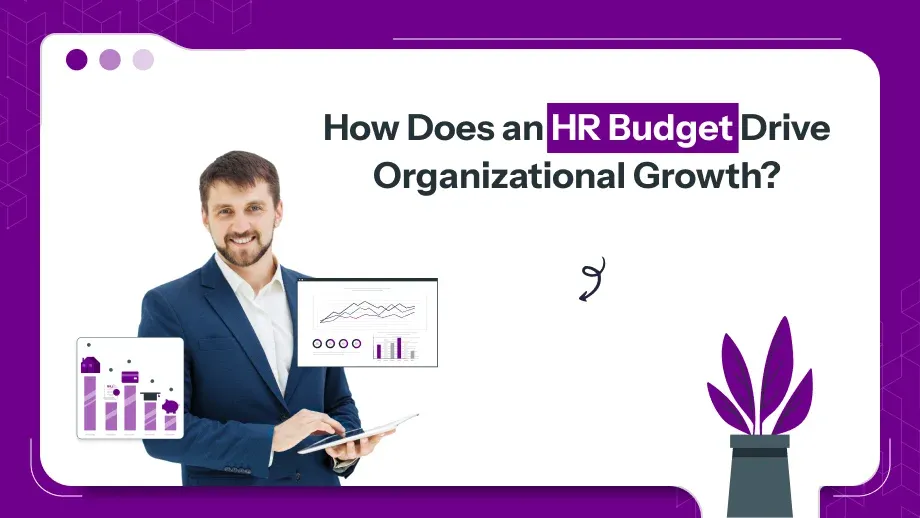
In today’s business climate businesses rely on their people to achieve their goals. The HR budget is a crucial element in making sure your team is efficient and effective, in a way that you can efficiently allocate the funds. It’s a financial plan that permits HR departments to organize, prioritize, and carry out various projects that are by the organization’s goals.
This guide will explain how a budget for HR can contribute to the growth of an organization.
Key aspects will be covered, such as HR budget planning, and essential HR budget components.
What Is an HR Budget?
A budget for HR can be defined as a budget that provides information on costs associated with managing people resources within an organization. This includes costs related to hiring and training, employee benefits, technology, and compliance. The budget of HR ensures that resources are allocated in a way to meet the short-term and longer-term goals of the business.
Key elements:
- Salaries and wages.
- Employee benefits.
- Training and development programs.
- Recruitment and onboarding costs.
- Compliance and legal fees.
- Investments in HR technology and tools.
Why Is HR Budget Planning Important?
HR budget planning is essential to make sure that strategies for the workforce coincide with the company’s objectives. The reason why this is important:
- Optimizing Resource: This assures that the financial resources are utilized efficiently, thus avoiding overspending or under-funding essential HR tasks.
- Strategic Alignment: aligning HR’s budget to business objectives helps in the overall growth of your organization.
- Proactive Decision-Making: Predicting the workforce needs and problems will enable HRM as well as HRM and HRD to plan efficiently their strategies.
- The satisfaction of employees: Allocating money for wellness benefits and engagement programs improves employee satisfaction and morale.
The HR Budgeting Process
The HR budgeting process involves several steps to create a comprehensive and effective plan. This process integrates aspects of Virtual HR tools to modernize workforce management:
Assess Current Needs
- Perform a workforce analysis to determine gaps in the capabilities, resources, or infrastructure.
- Examine previous budgets and their results to pinpoint the areas for improvement.
Set Goals and Prioritize
- Set clear goals for recruiting as well as training and involvement.
- Rank initiatives based on their potential ROI.
Forecast Future Costs
- Anticipate changes in workforce size, economic conditions, and industry trends.
- Use historical data and market benchmarks to estimate costs accurately.
Work with stakeholders
- Participate in department head and team leaders to ensure that HR objectives with the overall business goals.
- Gain stakeholder buy-in for critical initiatives.
Monitor and Adjust
- Track expenditures throughout the year.
- Adapt the budget to address unforeseen challenges or opportunities.
Struggling to make the most of your HR budget?
Unlock the potential of your workforce with smarter planning tools.
HR Budget Components
An effective budget of HR includes several critical components. Companies that utilize India HRMS solutions often have an advantage in streamlining these components:
Salaries and Wages
- Base salaries, overtime, and bonuses.
- Contributions to retirement plans and other statutory payments.
Recruitment Costs
- Job advertising and recruitment agency fees.
- Background checks and onboarding expenses.
Training and Development
- Employee upskilling programs.
- Leadership development and certification courses.
Employee Benefits
- Health insurance, wellness programs, and paid leaves.
- Perks such as travel allowances and flexible work options.
Compliance and Legal Fees
- Ensuring that you adhere to the laws of labor as well as tax laws.
- Costs associated with audits and legal consultations.
HR Technology
- The best investment is in the HRMS software in india and payroll systems.
- Tools for performance management and employee engagement.
HR Budget Format
While the HR budget format can vary depending on organizational size and industry, a standard format typically includes:
- Overview: Summary of total budget allocation.
- Line Items: Detailed breakdown of expenses (e.g., salaries, benefits, training).
- Justification: Explain the way each expense is aligned with the business objectives.
- Contingency Fund: This is the sum of money that is set aside for expenses unexpected.
How HR Budget Affects Organizational Growth
The HR can play a significant role in the growth of an organization by focusing on these categories. Companies leveraging tools from HR software companies in India often achieve measurable growth:
Talent Acquisition
A strategic approach to allocating money to recruitment will ensure that employers can attract and retain top talents. A well-funded and effective recruiting system improves efficiency when hiring, cuts down on the amount of time needed to recruit as well as helps to build a competitive workforce.
Employee Development
Training programs are budgeted to allow the employees to acquire skills that improve innovation and productivity. The organization is set up for long-term success with human capital investment through continuous learning.
Employee Retention
Allocating funds for employee engagement initiatives, wellness programs, and competitive benefits reduces turnover rates. A happy employee will be more likely to remain which will lead to stability in the organization as well as growth.
Technological Advancements
Investments in HR technology, such as HRMS Payroll Software in India as well as performance management tools help to streamline processes and minimize the inefficiency of operations. Technology-based HR practices help in more informed decision-making and improved employee experiences.
Compliance and Risk Management
An effective budget helps the organization remain compliant with labor laws and mitigate legal risks. Proactive compliance measures protect the organization’s reputation and financial health.
Challenges in HR Budgeting
An effective HR is prepared through a strategic approach. Here are detailed tips to ensure your HR payroll salary supports organizational growth and workforce satisfaction:
- Budget constraints: Small budgets can limit the reach of HR-related initiatives.
- Leadership Buy-in from Stakeholders: Convincing leaders to put HR first in their priorities can be a challenge.
- Economic uncertainty: Uncertain market conditions could affect the budgeting process.
- Changes in Workforce Needs: Being able to adapt to shifts in the demographics of the workforce and expectations demands flexibility.
Tips for Effective HR Budget Planning
Creating an effective HR budget requires a strategic approach. Here are detailed tips to ensure your HR training supports organizational growth and workforce satisfaction:
Use Data-Driven Insights
- Leverage HR analytics and past financial data to make informed decisions.
- Identify patterns in workforce expenses, such as overtime costs or high turnover rates, to plan better.
- Predict trends in recruitment and training needs based on historical data.
Set Realistic Goals
- Align the budget goals with the short-term and long-term objectives of organizations.
- Do not overestimate or underestimate the costs; make use of benchmarks from the industries to decide allocations.
- Develop KPIs- these are Key Performance Indicators for measuring the efficacies of the budget.
Engage Stakeholders
- Meet the department heads to understand staffing and training needs.
- Present clear justifications for budget allocations to senior management.
- Request stakeholder input to gain buy-in and congruence with organizational priorities.
High-Impact Areas
- Focus on those initiatives that have a direct influence on productivity and employee satisfaction; this comprises training programs, wellness initiatives, etc.
- Allocate resources for critical HR technology investments that streamline processes.
- Consider phased implementations for expensive projects to balance costs.
Monitor Performance Regularly
- Conduct quarterly reviews to track expenditures against the budget.
- Use dashboards and reporting tools to identify variances and adjust allocations.
- Engage finance teams to keep track of and have control over expenditures.
Plan for Contingencies
- Set aside a part of your budget for an emergency fund in case of unexpected costs.
- You must be prepared for unexpected changes like recessions in the market or sudden increases in hiring.
- Maintain flexibility to reallocate funds where needed.
Future Trends in HR Budgeting
Focus on Employee Wellness
Employee well-being is increasingly becoming a backbone of HR strategy. Companies are investing huge portions of their HR chatbot into mental health initiatives, physical fitness programs, and overall wellness packages. These investments aim to:
- Reduce employee burnout.
- Increase productivity and morale
- Enhance long-term employee retention
AI and Automation in HR Processes
Artificial Intelligence (AI) as well as automation have transformed HR functions and their implementation will require a dedicated budget allocation. HR teams are leveraging AI for:
- Talent acquisition and recruitment through smart applicant tracking systems.
- Predictive analytics for workforce planning.
- Payroll processing and compliance reporting through automation.
Diversity, Equity, and Inclusion (DE&I)
DE&I is increasingly at the core of HR strategy design and planning. Organizations are channeling funds to:
- Conduct diversity training programs.
- Implement equitable hiring practices.
- Create inclusive workplace environments.
Supporting Remote and Hybrid Work Models
Moving to remote or hybrid models of work needs new considerations for budgets. HR teams are focusing on:
- Equipping employees with necessary tools and technologies.
- Offering flexible work benefits.
- Ensuring robust virtual communication and collaboration platforms.
Increased Investment in Training and Upskilling
Re-skilling and upskilling employees has been essential in today’s fast-changing work market. HR models are increasingly focused on:
- Funding certification programs and workshops.
- Implementing Learning Management Systems (LMS).
- Offering leadership education to help build an army of future-ready workers.
Conclusion
The HR budget is much more than a mere budget for financial planning; it’s an effective tool to drive the growth of your organization. Companies focus on the most important elements like recruitment technologies, training, and compliance in order to build an employee that is successful within a highly competitive environment. To this end, companies need to prioritize budgeting for their HR department and adopt innovative methods to maximize their human resources.









